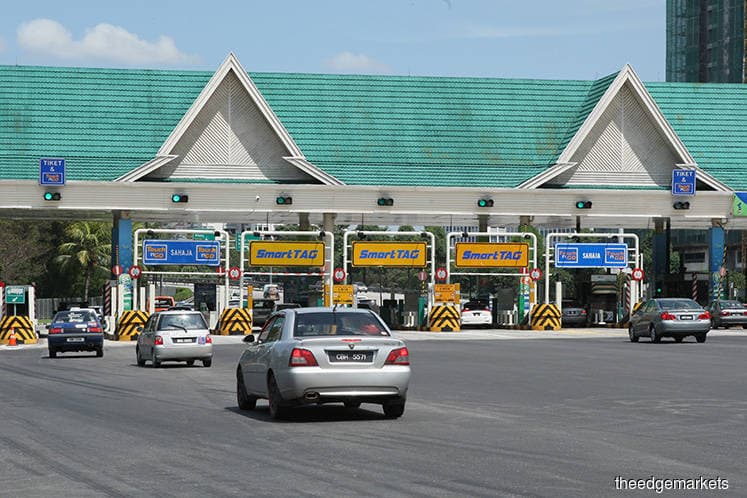
This article first appeared in The Edge Malaysia Weekly on August 20, 2018 - August 26, 2018
TOLL concessionaires were granted a reprieve early last week when Works Minister Baru Bian announced that the scrapping of tolls nationwide would be deferred until fiscal conditions permit.
“After we studied and reviewed the factors and implications, the cost required, as I have mentioned previously, is RM400 billion. So, the government has agreed to defer the abolishment until the country’s economy and fiscal position improve,” Baru declared.
As one of Pakatan Harapan’s election manifesto promises was to scrap tolled roads, highway concessionaires found themselves in a quandary following the coalition’s unexpected victory in the 14th general election in May.
After several months at the helm, however, reality appears to have set in — RM400 billion is a gargantuan sum of money and Pakatan Harapan appears to have acknowledged that abolishing tolls nationwide would not be feasible under the extremely tight fiscal conditions it inherited from the previous government under Barisan Nasional.
Yet, a few days later, special officer to the finance minister Tony Pua indicated that the buyout cost would be less than RM400 billion as concessionaires would only be compensated based on construction cost, although he said the amount had yet to be calculated.
“The amount of RM400 billion required to terminate all the toll concessions in the country is the amount used by the previous government, which takes into account the compensation to concessionaires by including their future profit.
“The amount that we use, if we want to buy out all the concessions — which we have not planned to do so yet — we will only compensate based on the rate stated in the contract, which is the construction cost and not future profit,” Pua said.
Analysts say Putrajaya needs to clearly spell out its stance on the issue as it affects toll operators, especially the listed ones.
“Listed entities want more clarity. They want the government to say that the toll abolishment will be deferred indefinitely or at least provide a time frame for the issue. This would help those with unprofitable highways when planning their debt refinancing activities,” says a bank-backed analyst.
However, a key factor in the scrapping of tolls is the expropriation clause, which requires the government to pay both the shareholders and bondholders.
AllianceDBS Research analyst Chong Tjen San opines that it would be unlikely for the government to exercise the expropriation clause in its contract with toll operators because it would cost a substantial sum of money. Such a move would also impact the domestic bond market as, according to RAM Ratings, the tolled road sector comprises 23 issuers with a whopping RM52.83 billion of bonds and sukuk outstanding. This excludes loan stock.
“It is difficult to say whether the toll concessionaires have got off the hook permanently, but at least over the near-to-medium term, it will not be such a concern for them anymore,” he says.
A head of research agrees that toll operators are off the hook at least for the time being, until the government’s fiscal position improves. “I always thought that a total abolishment of tolled roads is something that is out of the question because of how the contracts are structured. There is a lot of money involved and the government can’t just abolish one or two because it wouldn’t be meaningful,” he observes.
But he believes the issue could be revisited in some other form, either by reducing or maintaining current rates. In either case, it would mean compensating the operators for amounts due from scheduled rate increases as agreed upon in the contracts.
Be that as it may, Chong believes the confirmation of a deferment will remove the overhang weighing on the concessionaires.
“One example is Gamuda Bhd. Now that it has settled the water issue and toll abolishment has been deferred, there is much less overhang on the stock. The same can be said for IJM Corp Bhd’s West Coast Expressway, which is still under construction,” he says.
When it comes to future concessions, analysts believe they could be less lucrative as the terms will not be as favourable as before. But there are those who say it might still be worth their while, especially for larger players that have the requisite funding.
“The government will still need to rely on private sector funding for such infrastructure. It could be quite attractive for the bigger players, especially if they are allowed to participate in the construction works as well as [to] operate them,” says the bank-backed analyst.
Currently, there are nine listed companies involved in tolled operations, the largest being PLUS Malaysia Bhd, which is 51% owned by Khazanah Nasional Bhd via UEM Group Bhd. The remaining 49% is held by the Employees Provident Fund.
PLUS holds five concessions — North-South Expressway, North-South Expressway Central Link, Malaysia-Singapore Second Crossing, Butterworth Kulim Expressway and Penang Bridge.
Main board-listed Lingkaran Trans Kota Holdings Bhd (Litrak) — 43.58% owned by Gamuda — is the concessionaire for Lebuhraya Damansara-Puchong (LDP) and the Sprint Highway.
Another large listed concessionaire is IJM, which operates the Besraya Highway, New Pantai Expressway (NPE) and Lebuhraya Kajang-Seremban (LEKAS). It has a 26.46% stake in WCE Holdings Bhd, which holds the concession for the West Coast Expressway.
Other listed toll operators include Taliworks Corp Bhd, Bina Puri Holdings Bhd, Ekovest Bhd, Malaysian Resources Corp Bhd and Ahmad Zaki Resources Bhd.
Save by subscribing to us for your print and/or digital copy.
P/S: The Edge is also available on Apple's AppStore and Androids' Google Play.